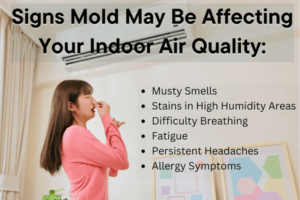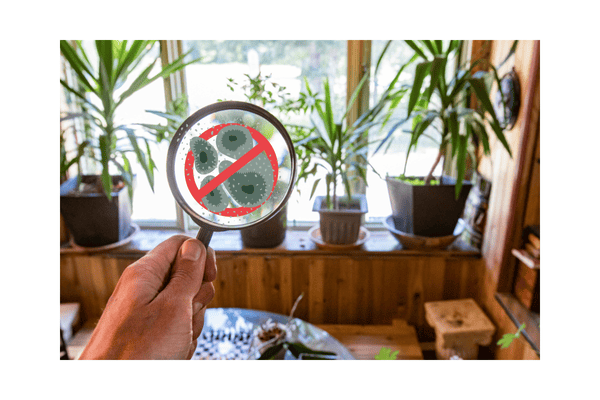Concerned about the air quality in your home or workplace? Mold is a factor you can’t ignore. Mold doesn’t just damage walls, carpets, and furniture—it affects the very air you breathe. At Sapphire Restoration, we understand how stressful mold issues can be, especially when your family’s health is at risk. Here, we’ll explore how mold impacts indoor air quality and what steps you can take to protect your home.
The Link Between Mold and Indoor Air Quality
Mold releases tiny particles called spores, which float through the air and spread wherever moisture is present. When mold grows indoors, it continually releases these spores, impacting the air quality and creating an environment filled with irritants and allergens.
In humid climates like San Antonio, mold growth can be particularly challenging. If left unchecked, it can spread through your HVAC system, circulating mold spores throughout your home.
Health Risks of Mold in the Air
Mold doesn’t just create an unpleasant smell—it can seriously impact your health. At Sapphire Restoration, we’ve seen how mold exposure affects families in different ways. Some experience mild symptoms, while others develop more severe respiratory issues. Here’s what you need to know about the health risks of mold in the air:
- Immediate Symptoms: Exposure to airborne mold spores can cause sneezing, headaches, coughing, and watery eyes. Those with asthma, allergies, or weakened immune systems may experience more severe reactions.
- Long-Term Health Effects: Prolonged exposure can lead to chronic respiratory problems, including infections and bronchitis. Studies from health organizations like the CDC show that long-term exposure to mold can be particularly harmful to young children and the elderly.
Signs Mold is Impacting Your Indoor Air Quality
Mold isn’t always visible. In many cases, the first sign of mold affecting your air quality is a stuffy or musty smell in your home. You might also notice physical symptoms, such as:
- Difficulty breathing

- Fatigue and mood changes
- Persistent headaches
- Allergic reactions, like itchy eyes and skin
Here’s a quick checklist to assess whether mold might be affecting your air quality:
- Do you smell a musty odor, especially when your HVAC system is running?
- Are there spots or stains in areas with high humidity, like the bathroom or basement?
- Are family members experiencing unexplained allergy-like symptoms?
Immediate Steps to Take if Mold is Present
If you suspect mold, there are a few immediate steps you can take:
- Increase Ventilation: Open windows to improve airflow, but avoid using fans that might spread spores.
- Control Humidity: Use a dehumidifier to lower moisture levels, especially in damp areas.
- Avoid Using Your HVAC System: Mold can spread quickly through vents. Turn off the system if you notice mold in or near it.
If mold appears to be extensive or hidden, it’s time to call professionals. Sapphire Restoration can assess the problem and recommend safe, effective solutions.
Testing for Mold and Assessing Indoor Air Quality
While home mold tests are available, they often don’t give the complete picture. Here’s why professional testing is more reliable:
- Types of Tests: We offer air quality assessments and surface sampling to accurately detect mold presence and identify the type of mold.
- Limitations of DIY Tests: Many home tests only measure mold levels at a single moment and can be influenced by humidity, time of day, and location.
Our certified experts can provide a thorough evaluation, interpret the results, and offer customized remediation options based on your home’s specific needs.
Prevention Tips for Keeping Indoor Air Quality Safe
Preventing mold is key to maintaining a safe indoor environment. Here’s how to keep mold at bay:
- Control Humidity: Mold thrives in damp environments, so aim to keep your home’s humidity level below 60%. A dehumidifier is a simple way to help.
- Regular Cleaning: Clean bathrooms and kitchens regularly with mold-fighting solutions like vinegar or hydrogen peroxide.
- Advanced Prevention: Use mold-resistant paint, install HEPA filters in air purifiers, and inspect your HVAC system to ensure it’s mold-free.
Natural Remedies to Improve Indoor Air Quality
For those who prefer natural solutions, here are a few remedies that can help control mold:
- Tea Tree Oil: Mix a few drops with water in a spray bottle and use in areas where mold is prone.
- Vinegar Spray: Spray a mixture of vinegar and water to clean mold-prone areas.
- Indoor Plants: Certain plants like peace lilies and snake plants improve air quality, but keep in mind that plants alone can’t eliminate mold spores.
Using these natural methods, you can improve air quality and control minor mold issues.
When and Why to Call in the Professionals
While DIY methods can help with minor mold problems, large or hidden mold infestations require expert intervention. Here’s when to consider calling Sapphire Restoration:
- Extensive Growth: When mold is widespread or hard to reach, professional remediation is necessary to ensure safe and effective removal.
- Recurring Mold: If mold keeps coming back, it could be a sign of deeper issues. Our team can identify the source and offer a long-term solution.
At Sapphire Restoration, we combine our family-owned values with industry-leading expertise to deliver honest, reliable mold remediation services. Our IICRC-certified technicians are here to restore your home and give you peace of mind.
Honesty First—A Trustworthy Approach to Mold Inspections
When a San Antonio family grew concerned about a musty smell in their attic, they contacted Sapphire Restoration, fearing a mold issue. Yeshiah, one of our trusted inspectors, conducted a thorough examination and found no need for intervention. He assured the family that their attic was mold-free, providing honest, straightforward information instead of recommending unnecessary services. The family appreciated our commitment to transparency and free inspection, knowing they could rely on us for future needs.
At Sapphire Restoration, we believe in doing what’s right. If your home doesn’t require professional intervention, we’ll tell you—because honesty is at the heart of our service.
FAQs: Common Questions About Mold and Indoor Air Quality

Can mold spores travel through walls?
Yes, mold spores can spread through tiny cracks and air gaps, often traveling from one room to another.
How often should I check for mold in my home?
Regularly inspect high-moisture areas like bathrooms and basements, especially in humid climates. We recommend a professional assessment every 1–2 years.
Are there plants that help with indoor air quality?
Yes, plants like peace lilies can improve air quality, but they won’t eliminate mold spores. An air purifier with a HEPA filter is more effective.
Protect Your Indoor Air Quality with Sapphire Restoration
Mold can silently affect your home’s air quality, posing health risks and disrupting your family’s comfort. At Sapphire Restoration, we are here to provide expert mold assessments and solutions, so you can breathe easier. Don’t wait for the problem to worsen—contact us for a free inspection and ensure your home’s air quality is safe.
Call Us Today for Free Consultation!
Whether you’re in Alamo Heights, Stone Oak, or Bulverde, our team is ready to help you create a safer, healthier home environment.

